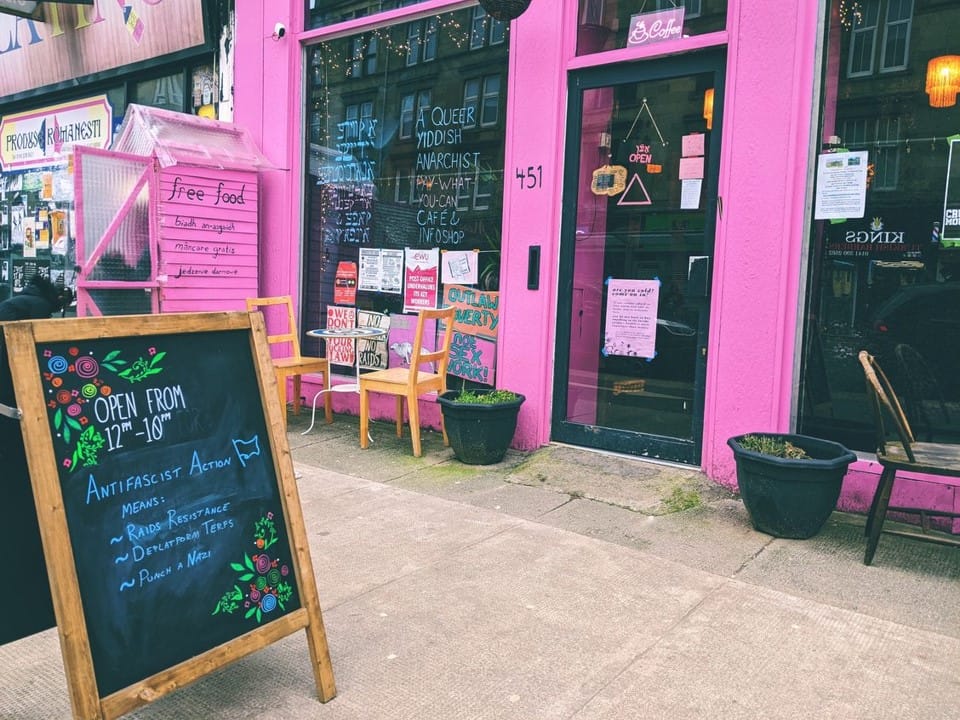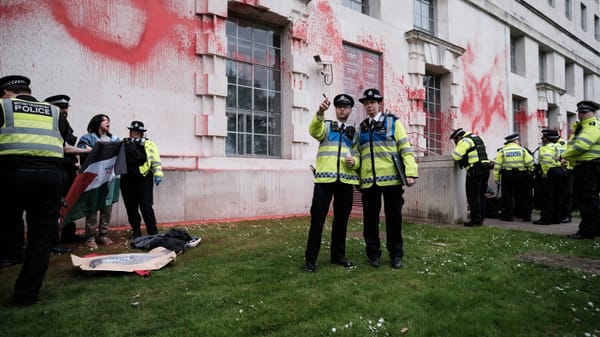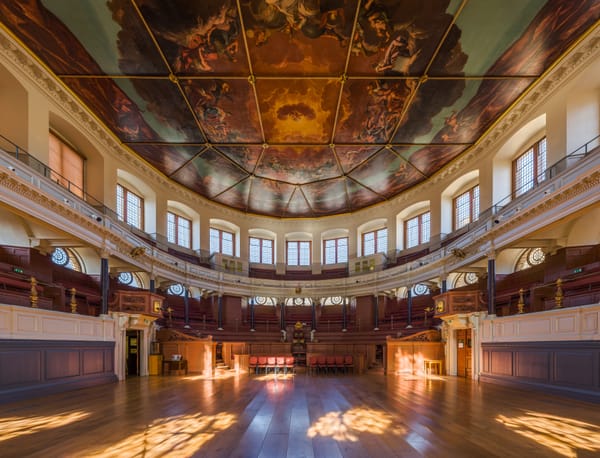The Pink Peacock’s premature demise
Members of the collective tell Vashti why the radical Govanhill cafe has been forced to close its doors for good.

The Pink Peacock, or di rozeve pave in phonetic Yiddish, was a one-of-a-kind endeavour: an English-Yiddish bilingual cafe whose other descriptors included anarchist, anti-Zionist, queer, dry, vegan and pay-as-you-can. The community-based and collective-owned space in the Govanhill neighbourhood of Glasgow first opened its physical doors in September 2021, after more than a year of Covid-induced online activity. Two weeks ago, it closed those same doors for the last time.
In a statement issued by the collective in early June, burnout is noted as the key cause for the closure. As a volunteer-run initiative, the collective explained: “like everyone we’re struggling under capitalism and kyriarchy [a social system built on subjugation and oppression].” But this isn’t the only reason. The statement also mentions “antisemitic vitriol … from self-described leftists”, racism from white collective members towards people of colour in the group, and difficulty maintaining opening hours.
Speaking with two members of the collective, morgan holleb and Michael Isaac Temple, it becomes clear that the Pink Peacock’s closing statement barely scratches the surface of the acrimony that’s unfolded – and that’s been borne out in the reactions that the announcement provoked.

On the one hand, there have been hundreds of messages of support. Many are mourning the loss of this space, including folks who have never even visited. For people around the world, the Pink Peacock’s mere existence was enough to inspire solidarity and connection.
Yet at the same time, there has also been considerable online backlash. Some of it, like the gloating from right-wingers, is to be expected. More puzzling are the critiques that have emerged from leftists, Jews and queer people, as well as members of the Govanhill community. A long Reddit thread screams insult after insult, while Twitter is heaving with critical quote tweets and pile ons. So what are we to make of all this?
Antisemitism-laden critiques
The majority of the criticism revolves around a few key themes: that the Pink Peacock was “gentrifying” because a few of its members are American; that it is run by “rich, middle-class white people” who could afford to buoy up the rent even if the cafe wasn’t making enough money; that collective members are “arrogant” and “saviours”; and that instead of responding to criticism along the way, they would default to claiming it was antisemitic or queerphobic in an attempt to brush it aside.
Raising these critiques with holleb and Temple, it’s clear that they have tried to engage with everything that’s been thrown at them, but they can’t shake off the feeling that much of what underlies such reactions is antisemitism.
With regard to the gentrification angle, holleb reflects that it’s a little unclear if people are referring to the cafe itself, him personally (lots of criticism is directed specifically at him), the collective, or something else. In any event, holleb says, “to suggest that a free food project is displacing people is ridiculous. It’s anti-gentrification, because it’s providing a basic human right for free. I guess what people are trying to get at is that gentrification is the displacement of Glaswegians by “invaders” – to which end they mean Jews.”

Other accusations towards the cafe’s “owners” – which they didn’t have; it was collectively run – revolving around wealth and privilege are riddled with the same uncomfortable notions. There’s been an insistence that the Pink Peacock is a for-profit business; it’s not and never has been. Some people have accused the cafe of stealing £250,000 that was crowdfunded, but they never raised anywhere near that much, and the £18,000 that was sourced from small donations has been spent exactly as they said it would be.
What’s more, the cafe’s obvious Jewishness became interchangeable with being Israeli, or Zionist, or both – it’s often hard to tell – despite the collective’s dedication to anti-Zionism as a governing principle. “People see Yiddish on the outside and they’re like, look at those rich Israelis. But because they don’t even know the right words to use to be overtly antisemitic, it just gets swept under the radar,” says Temple. Given that very few Jewish spaces in the UK are even neutral on Israel, let alone decidedly anti-Zionist, such criticisms seem misguided at best, and antisemitic at worst.
In a similar vein, some people have accused the collective of bringing cops into an area largely inhabited by migrants and people of colour, putting them in danger. This is a valid concern, but as holleb and Temple point out, the Pink Peacock didn’t actively entice cops in, they simply existed in resistance to the state – which, unsurprisingly, drew the attention of its enforcers. They don’t believe they should have held back on their opposition to cops; this demand is not made of other organising groups and spaces. And had they not taken such a stance, they add, it’s likely they would have been criticised for not being abolitionist enough.
This catch-22 is a position Jewish people are often backed into. “Jews are both timid and arrogant, we’re useless but we control everything, we’re inferior but elite,” holleb says. “It was really important for our politics for abolition to be centred because other queer spaces, and other Jewish spaces, don’t always do this.”

It’s important to bear in mind that while these antisemitism-laden critiques have erupted on social media in the wake of the closure announcement, they have been present from the start – such as holleb being labelled “arrogant”. “If you dare to dream of something better or to suggest that a community can become empowered, that is ‘arrogant’ – the implication being that if I say I can make any kind of difference in the world then I must think I’m better than everyone else,” he hits back.
Internal racism
There are also key elements to the unfolding drama that they only touch upon in the statement, but which, upon reflection, look to be some of the leading factors contributing to the cafe’s closure – namely, the internal racism experienced by Temple. Despite the cafe’s income problems, he says solemnly, “I think if it weren’t for the racism, we would have been okay.”
What happened, in brief, was that around two months before the Pink Peacock’s closure, a request came through for an event that Temple, the only Black member of the collective (he is also Indigenous), felt was anti-Black. “In accordance with our policy, if something makes someone in the collective uncomfortable, we just take that as a no – no questions asked,” he says. But a white collective member went back to the person requesting to host the event and apologised for Temple’s “racism”.
At that point, all Temple asked for was an acknowledgement and an apology, but he got neither. Instead, other white collective members piled on, spreading cruel rumours, yelling at Temple, and ultimately casting racial slurs. In one case this came out in the assertion that Temple was “utilising the unfair power that Black people wield as social capital in leftist spaces.” This culminated in someone using the N-word in a group chat, at which point nobody could deny the extent of the ongoing racism.
Even after this, many members still didn’t grasp the significance of the situation and why Temple was asking for an apology. He doesn’t want to lend legitimacy to the idea of “leftist infighting” as a cause for rupture in radical spaces, but it’s impossible to dismiss the idea completely. In this case, and as is common in spaces and groups seemingly united by the same ideals, the problem was that too much was left to assumption, and not enough was organised by active agreement. “Because everybody agrees so much about the same values [generally], it can take a long time to find out what people really believe about racism,” Temple says.

“[Some collective members] were unable to have empathy for my suffering because they are white and they’re used to having power and not having to empathise with Black pain,” he continues. “They empathise with the person who has done the bad thing and feel nothing for me. This is a really harrowing and consistent problem on the left, and it’s something I really want people to think about when they’re organising anarchist, Jewish spaces.”
Uncertain futures
For Temple, now is a time to try and survive, not wade through online trolls – even if underneath the hate there are some useful comments and constructive pieces of advice. “I’m not only losing something that was important to me politically, but I’m trying to get a couple of bucks together for meals, for shoes without holes in them. These are things I now won’t have, that other people in the collective won’t have.
“I’ve never felt safer, more welcome, or more whole anywhere in my life than I did at the Pink Peacock,” he continues. “I came there to work because I was homeless, and then I realised not only would they feed me, but they were gonna keep feeding me, let me do my events and try to help me get my life back together.” This loss rests heavily on his shoulders, but he is keen to make clear that he is not a lost cause: he’s still doing radical Jewish art and activism through Twitter and Instagram, and also has a Jewish anarchofeminist Dungeons & Dragons podcast called Silver and Vinegar that’s available on Spotify (he’s currently open to work enquiries).
As for the Pink Peacock and the rest of the collective, it’s unclear what the future holds. For now, they’re keeping their social media accounts open to share updates from collective members and retain access to their archive of radical, Jewish, queer, anarchist content.
The Pink Peacock never claimed to be perfect; it was, like all abolitionist, anti-capitalist projects, a work in progress. As the final line of their closing statement reads: “oylam ha’bo / the world to come / revolution is inevitable, and we’re so glad the pink peacock was part of bringing it closer, in our small way. this is the end of the cafe, but it isn’t the end of our queer jewish anarchism: watch out, we’re everywhere!”▼
Molly Lipson is a freelance writer and an organiser based in the UK.




